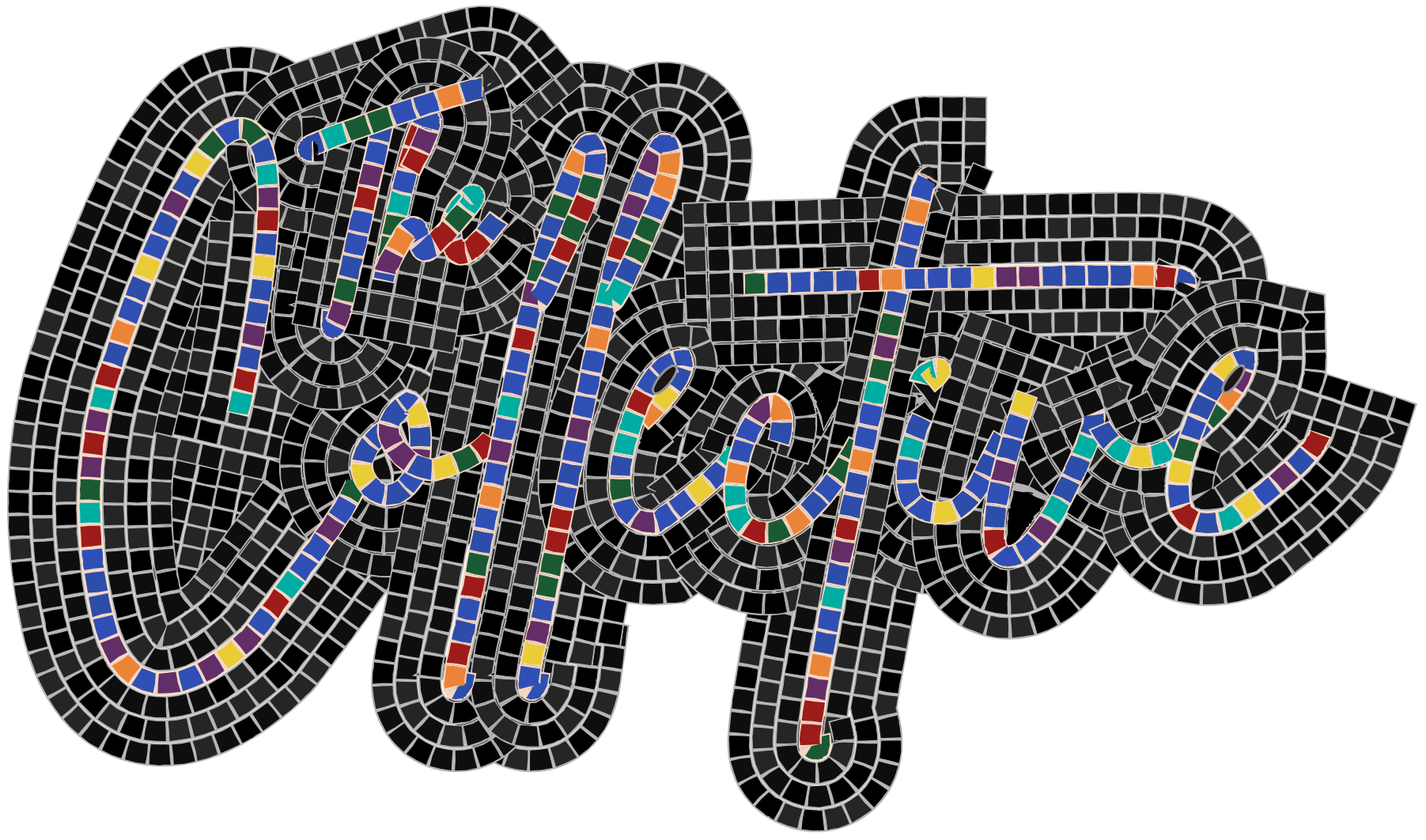My eldest daughter was born a month and a half after I completed my preliminary doctoral exams; my youngest was born barely a year before I submitted my dissertation for graduation. During these integral years of their development, my research and work as an adjunct demanded long hours of traveling on the road to and from various institutions, organizing and writing my dissertation in the dimly lit and often musty basement of our rented house, and spending many a sleepless night trying to catch up with readings while rocking one or both of my daughters. Reconciling these two halves of my life has been difficult on all members of my family.
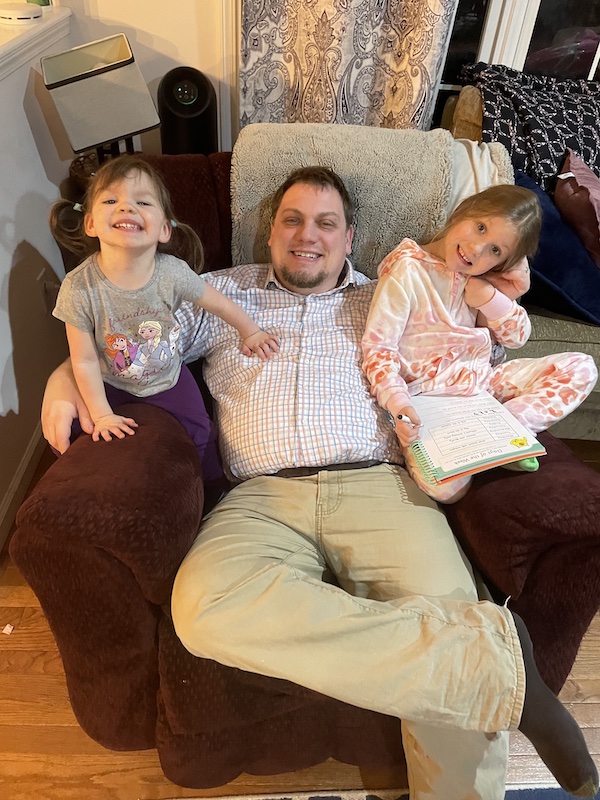
Finding time to write articles and conference papers (or submitting them late), applying for jobs, and working across multiple campuses has left me feeling behind my childless peers, who seem to have infinitely more time to complete the “supra-elements” of the job that are a must for securing permanent work. Neither has this itinerant lifestyle been conducive to spending the time I wish to have with my family. I don’t believe that I’m jaded; I love my children and being a father. But I can’t help but feel that the job market is stacked against me because I have chosen to have children.
My experience is not a unique one among recent PhD-earners in academic careers; parents working on their PhDs or in non-tenure-track (hereafter NTT) positions occupy marginalized positions in academia. As Dutch scholars Marloes van Engen, Inge Bleijenbergh, and Susanne Beijer note:
Academia as a profession is often construed to be all-encompassing and even a ‘calling’ without much room for other identities. The dominant discourse expects academics to work long hours, be available 24-7, avoid teaching and administration duties in favour of a single-minded pursuit of status promoting research.[1]
According to these scholars, this single-minded focus constitutes an “embedded hegemonic masculinity,” meaning academia prizes competition, performance, and availability — attributes that are, in fact, quite difficult to achieve and maintain as a parent.[2] Studies like those by van Engen help to legitimize the frustration I feel as an early career academic, yet their study — like many other recent studies on the subject — is only now drawing attention to this widespread phenomenon.[3] And their study, like many others, is limited by the pool of participants, which largely consists of individuals who are already in tenure-track positions, inadvertently dismissing or, perhaps forgetting to include, those NTT and graduate student parents.
Similarly, the scholarship that does exist on parents has overwhelmingly focused on the experiences of mothers, relegating the experiences of fathers to the margins.[4] This is, of course, due in large part to the fact that mothers, despite major developments toward gender equality in the last fifty years, still take on more of the burden of parenting and thus experience more disenfranchisement and hardships in building their careers. While more scholarship on mothers in academia is both necessary and needed, fathers in academia have also been underresearched, as the often antiquated gender role they inhabit has unfortunately remained “normal” throughout academia: fathers are expected to publish, to attend conferences and colloquiums, and to teach a normal class load without much regard for their domestic life; as the scholarship shows, fathers largely negotiate this role without much complaint, or else they are expected to comply with the role of employee first and parent second, without vocalizing their experience. More nuanced scholarship on fathers, despite any perceived or actual advantages fathers possess, is needed in order to present a more holistic view of parenthood in academia.
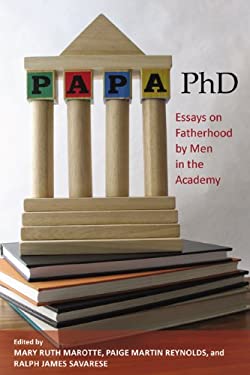
As a means of better articulating and contextualizing my own experience, I began exploring research on people like me. I identify as a father, husband, and early-career historical musicologist focused on twentieth-century American music. I was interested in finding studies that resonated with my own, but quickly found that few studies truly did. When conducting this initial study, I was excited to find a title in the works called Dads in Academia: Male Voices in and Out of the Ivory Tower, which has been in the production queue at the University of Pennsylvania Press since 2009. However, it’s unclear at present if this title will be published. I was fortunate to find a different book, Papa, PhD, which offers a series of essays written by fathers, documenting their stories at home.[5] As the editors of Papa, PhD note in their introduction, there is a stigma associated with the working father; “men…might feel just as torn as women [when negotiating their work and family lives], but they are encouraged to keep quiet.”[6] In this essay, I explore the two states of research into fathers in academia, considering both formal research and anecdotal stories of fathers in academia. As I examine these sources, I provide my own counterpoint considering points of resonance and dissonance with the existing scholarship. It is my hope that this work will spawn a larger conversation about how parents negotiate their work within the academy, especially during the early years of their career.
Research on mothers and fathers
Although I will explore the scholarship on fathers shortly, it may help to first consider the scholarship on mothers, which dominates the current narrative of parenthood in academia. In one of the most recent articles on parenthood in academia, Karyn Miller and Jacqueline Riley — both in the educational policy area at Texas A&M University-Commerce — focus exclusively on mothers in the academic workforce. They contend that academia produces an “ethos that has penalized mothers and provided remunerative benefits for fathers, especially at the top of the income distribution.”[7] According to Miller and Riley, academia enforces and reinforces an “ideal worker norm, of constant devotion to work” and, as a result, mothers are more likely to leave academia to support their families.[8] Miller and Riley note that academia’s antiquated gender norms are more intense for academic mothers than academic fathers.

Despite the many great quotations they received from mothers, Miller and Riley’s study is characteristic of the inherent bias in current scholarship on parents. Their study took samples from 134 mothers, but just seven fathers. Of the seven fathers included only two had two or more children. From this sample, thirty of the 134 mothers were in the early stages of their careers, either adjuncts or instructors. Only one father at the adjunct level was surveyed.
Like Miller and Riley, Allison Morgan, et. al. note that there is a clear difference between the number of papers mothers and fathers can expect to publish in their early careers. They calculated cumulative productivity from a period of five years before attaining a tenure-track position to ten years after. Among historians — as a musicologist I found this category to be the most useful — they noted that there is a 19.32% difference between men with and without children, whereas the difference of women with and without children is 48.25%.[9] The difference between mothers and non-parent males is more drastic: mothers can expect to publish 3.1 fewer papers each year than their male colleagues.[10] Notably, this study shows that NTT parents are much slower to produce their first two articles; Morgan et. al. show that it takes an average of five years for parents to publish two works, whereas their non-parent colleagues reach two publications about a year earlier. Notably, Morgan et. al. suggest that since the year 2000 mothers have produced more publications on average, so the gap between mothers and fathers is decreasing.[11] Yet, this gap is still quite apparent when comparing parents to non-parents.
Robin Wilson, a former staff writer at the Chronicle of Higher Education, cites research conducted by Mary Ann Mason and Marc Goulden at the University of California, Berkley, who note, “The worst time for women who pursue careers in academe to have a baby is within the first five years of earning a Ph.D.”[12] It is haunting to see this pervasive sentiment in academia codified through statistics collected by the two authors, which immediately clarifies the effect of parenthood on the number of articles published, jobs attained, and time spent in domestic activities. Curiously, Mason and Goulden’s study is one of the few that considers the early career trajectory of parents nearing the end of their PhDs. Although Wilson’s interpretation of Mason and Goulden’s research mentions fathers in passing, Mason and Goulden’s study compares and contrasts several types of academics, including fathers and their non-parent male colleagues.

For instance, in one analysis, Mason and Goulden note that fathers can expect to spend fifty-six hours a week on professional duties, twelve hours on housework, and twenty hours on caregiving, whereas, their non-parent colleagues spend an average of fifty-nine hours a week on professional duties, eleven hours on housework, and nine on caregiving — unfortunately, they do not define what “caregiving” entails for non-parents.[13] While these results certainly pale in comparison to the experience of mothers in academia — who have only fifty-one hours to devote to professional work and an expected thirty-six hours of caregiving — finding and maintaining a healthy work-life balance is difficult for all parents. Yet, this compartmentalization of time and these oversimplified categories merely suggest more time is allotted for different life activities; the results do not suggest ways we can change the demands of the job to meet the needs of parents.
Needless to say, after discovering these initial sources, I was left feeling more depressed. I wondered: am I just struggling more than other fathers at achieving balance? According to the studies I was finding, I should be performing much better in both roles than I am. I think it’s perfectly acceptable to say: fathers do experience difficulties, especially in their early careers. One of the clearest studies on the subject was conducted by Richard Reddick, department chair of the Education Management Area at the University of Texas at Austin. Reddick explores the role of fathers from the perspective of Work-Family Conflict (WFC), which he defines as a “stressor in which work responsibilities collide with family life duties.”[14] Notably, Reddick notes that 59% of fathers report WFC compared to 45% of women.[15]
One such conflict that Reddick explores is paternal and sick leave.[16] This is, in fact, a widespread issue that exists in many workplaces across the United States, but one that is especially apparent in academia. As a graduate student I received two weeks of leave when my second daughter was born, but following these two weeks I was expected to return to work as normal. I feel fortunate to have received paternal leave from the University of Illinois while I was dissertating, as many workplaces do not offer such options for fathers. (Although, paternal leave is improving across academia.)[17]

That said, two weeks is not enough.[18] Any parent, regardless of how they identify, can tell you that regular sleep patterns simply do not reinstate themselves after a mere two weeks. In fact neither of my children slept through the night until they were nearly eleven months old. This prolonged family duty had a direct impact on my ability to write, conduct research, and teach. Now that my children are older, they may sleep through the night with more regularity, but their needs still affect both me and my wife and our collective sleep patterns. It should also be noted that the state of Illinois does not offer parental leave protections. As a part-time employee of the University, I was not eligible to receive Family and Medical Leave (FMLA), benefits that would have allowed me to take up to six months of leave. While my wife, who holds a non-academic job, was able to spend additional time with both of our children through FMLA, my university and my part-time role demanded that I return to the job. (As an aside, I think it’s completely ridiculous that parents must claim disability to receive extra time with their children in the first few months of life, and even this added time is woefully inadequate.)
The simple fact is that fathers, regardless of their occupation, need to be afforded more quality, non-working time to bond with their children. According to Richard J. Petts, Chris Knoester, and Jane Waldfogel, there is a direct correlation between fathers taking more than two weeks of leave and their reports of having a positive relationship with their child, maintaining their involvement in their child’s life, supporting their spouse or partner’s feelings of co-parenting support, and self-describing themselves with a “Good Father Identity.”[19] Additionally, after surveying nine-year-old children about their relationship with their fathers, Petts, Knoester, and Waldfogel found a greater correlation between children who described their relationship with their father as being positive if their father took more than two weeks off when they were born than those fathers who took less or no time off. A great number of external factors could be influencing these results, but it seems clear that fathers need more time to build positive relationships with their children. Early-career academic fathers (PhD students, candidates, part-time adjuncts) are not often allowed to take this time. As was my case, two weeks was the absolute maximum I could take without the absence severely altering my pay.

Paternity leave is not the only issue affecting early-career fathers. As Reddick notes, sick leave is also something of a taboo for fathers in the academy.[20] During the end of the COVID-19 lockdown, everyone in my family besides me caught COVID. I requested time off from my university and was given permission to broadcast my courses over Zoom, but I was expected to continue working. Unfortunately, my wife’s employer expected the same of her. Since I was not COVID-positive, I was expected to resume classes in-person and was disallowed from taking time off to support her, while my wife had to quarantine with both girls while working. Her experience was by far worse than my own, but as a father I experienced the fallout of the lack of support for maternal sick leave. Why couldn’t I stay home to assist my wife with the children? Why did it need to fall to her to take care of them while sick herself? Adjuncting at multiple universities only exacerbated the issue of me taking sick leave, especially since I was balancing multiple positions in a single day. Every university I have worked for has maintained the expectation that I continue to teach my courses in some capacity (via Zoom, online lectures, or make-up sessions) when taking a sick day; little to no regard has been given to how I might have the time and focus to make alternative accommodations. There are some advocates that have supported me when I’ve needed to take time off, but I truly think there are systemic issues within the adjunct market that favor the single parentless professor.
Another systemic issue that Reddick explores is the bias against active fathering. He notes, “Respondents observed that in academia, men were generally seen as subordinate to women as parents. Thus fathers choosing an active parenting role perceived that their orientation was at odds with the expectations in academe.”[21] Reddick notes that fathers cope with these stressors by: 1) compartmentalizing work life and home life, 2) communicating with colleagues about parent issues, 3) using their family as a psychological “buffer” to work, and 4) overcommitting, i.e. neglecting one’s personal well-being to accommodate both aspects of their lives.[22]
I feel all of these coping mechanisms. Yet, coping in this manner is incredibly unhealthy and potentially dangerous for one or both of my compartmentalized lives — my life as a father and my life as an academic. As my wife frequently reminds me, you can’t just turn off being a parent.
However, Reddick’s research is predominantly concerned with those fathers who are already in tenure-track positions. He does not consider NTT. If I am feeling all of the stressors now that my tenure-seeking colleagues are facing, what will a tenure-track role involve for me? Will the tenure-track career path even exist as an opportunity?
There are at least four academic parents that graduated within my cohort, including two outside of my discipline that TA’d with me. Of these four, all have left academia for non-profit jobs or have otherwise transitioned to academic support or even academic-adjacent roles. Emigrating away from tenure-track roles is, from my narrow perspective, a common practice among early career academics; yet, I haven’t been able to find much scholarship on the subject, nor have many former academics written about their perspective on this shift in career trajectory.[23]The phenomenon largely remains an unspoken and potential trajectory for academic parents, including myself.
Essays about the other side of the coin
The weight of this scholarship, in even a short article such as this, presents a bleak image for parenthood in academia. But I would contend that these studies presented above only consider the role of fatherhood from a one-sided perspective, painting a picture of parenthood from the side of the job and not from the perspective of the parent. These studies don’t represent the positives of parenting, the numerous benefits having a family can have on life positivity. Where are the studies that discuss coming home from teaching at three different academic jobs and being rejuvenated through the act of playing with your children? Where are the voices of non-traditional graduate student parents who successfully navigated a dissertation while parenting one or more children?
These questions drove me to find essays related to my experience and were the reason why I was so taken by the many stories presented in Papa, PhD, which features a series of essays about fatherhood written by fathers in academia. These essays showed me that others have had similar experiences to my own. I took comfort in reading David Haven Blake’s story about the act of reading to his children. He notes:
For better or worse, my daughter and son associate our relationship with language, with the delights of books, newspapers, magazines, lyrics, the repartee on television shows. My head can be halfway inside the dryer, my arm grasping at some elusive sock, and my son will stand directly behind me and begin to read a favorite passage from a book. How can I find this frustrating when he has seen me do relatively the same thing hundreds of times before?[24]
I, too, find myself connecting to my daughters through the acts of teaching and reading, through sharing experiences and knowledge; and hearing my daughters share their stories is a great pleasure for me. I love both my daughters unconditionally. Taking time to write that fills me with joy. This is not a scholarly way of expressing the emotion, but I love the act of collaboratively sharing knowledge with them and learning from them.
I would not hazard to say this is true of all two-parent households, but in our family my wife and I adopt different supporting roles from one another. Our children often turn to her for comfort — when they’re in a bad mood, sad, or upset about something, she is the one they seek, whereas when they want to build a pillow fort, sip imagined tea at a fancy tea party, squish playdough cats, or kick a soccer ball around the backyard, I am the parent that they seek out more often than not. Sharing different types of play experiences with them is a joy for me and has helped me build strong bonds with both of them. Play has also served as a vital distraction from work-related activities. While I was dissertating, I took play breaks from writing that were likely quite detrimental to my train of thought, but absolutely necessary for me as a parent.
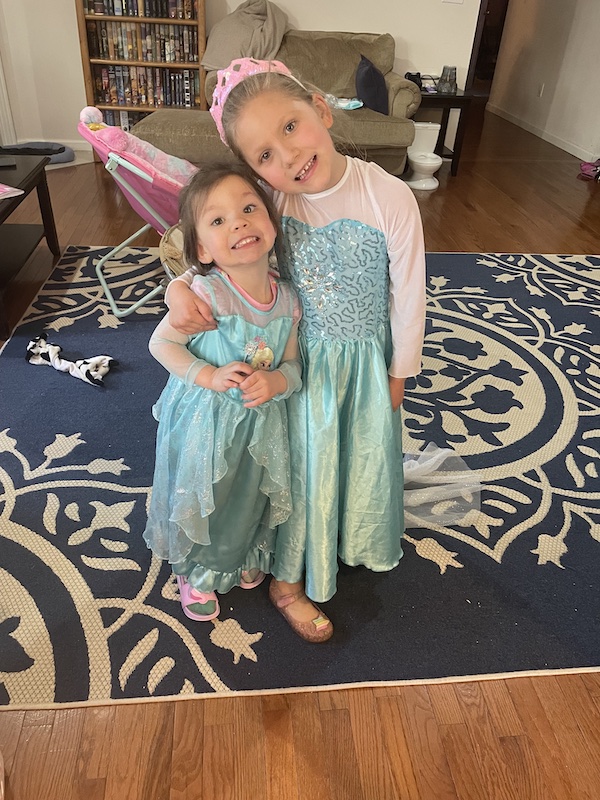

The book also explores other less appealing aspects of parenting. For instance, Ira Strauber reflects upon his daughter’s development of a stutter, considering it a moment of “failed parenting.”[25] His anxiety about living up to an idealized image of a father resonates with the imposter syndrome many early career academics and fathers feel. As a father, I, too, have felt like an imposter with my youngest daughter. Neither my wife nor I know exactly why she did this, but beginning at seven months my youngest would wake in the middle of the night, screaming. The behavior was exacerbated when it was my turn to rock her back to sleep. The inevitable questions from my wife, “Why can’t you put her down? Why does it have to be me?,” weighed heavily on both of us. Neither my parents nor my wife’s parents lived close enough to assist us. After five months of this, we sought help with Early Intervention Services. From their advice, we think it might have been that she felt confined in her crib — she’d also fuss whenever we put her in certain outfits and whenever we tried to put her in a high chair — but for some reason (the way I held her, the speed that I rocked her, the way I smelled?) she did not want to rock with me. Feeling like an imposter was a constant emotion during these early months of her life.
Being a father can be frustrating. Gregory Orfalea highlights this in a visceral and horrific essay. He recounts a moment when he slapped his son after swearing (he refers to this as his “Jabaly Temper”), a flare-up from projecting onto his children a desire for them to behave a certain way. After the incident he notes, “I felt ashamed, even horrified. I stopped, apologized, but wondered what would become of it.”[26] This terrible scene left an indelible impression upon me. For I, too, have felt anger as a parent, frustration that seems to emanate from my own self-doubt in my role as a father, as a worker, as an academic.
I do not mean to legitimize the abuse in Orfalea’s essay, but I think his story shows that while projecting one’s emotions onto and being outwardly violent toward a child is never healthy, all parents feel frustration and anger towards their child at some point. This is true of any parent in any occupation. I think the demands the academy places upon early career academics (to produce innovative research and teach massive classes or multiple classes across several universities in order to make a living wage) can lead to unhealthy work-life balances where frustration with one’s work is conflated with frustration with one’s family.
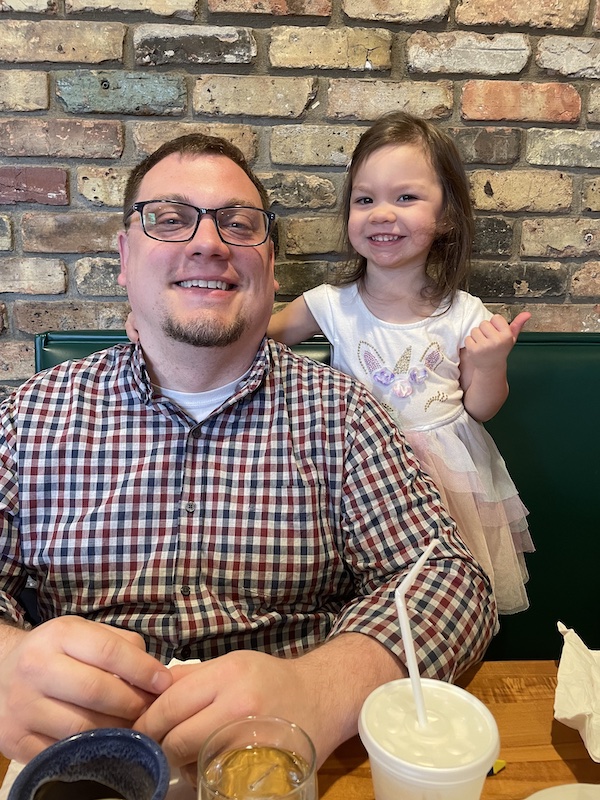
Personally, I have to remind myself to de-escalate conflicts on a regular basis. I often feel like I am a terrible father because my gut instinct is to shout when one or both of my children do something inappropriate. Despite the researcher in me wishing that it were so, I do not think practical parenting skills, like the ability to de-escalate anger, is something easily learned from a book. As silly as it may sound, I really wish there had been a class I could have joined to learn from others about expected learning metrics and behavioral benchmarks, to ask questions of other fathers, and to join in a safe space where I could both vent my frustrations and share my successes as a father. The closest experience I have had that has begun to teach me these things has been my experience working with Early Intervention Services. As a component of this work with my youngest daughter, my wife and I worked with both an occupational therapist and a behavioral specialist. Both of these individuals have provided us with a toolkit to address behavioral challenges and a sounding board to reinforce our successes as parents. From them, I have learned to take breathers when upset, because if I am not calm, I cannot calm my own child. This experience has been an invaluable system of support for my family, but they are services that aren’t often discussed in academic settings.
The University of Illinois system does offer support for graduate student parents, but I would contend it is not enough. Although the University’s website on parenting does provide a list of services in the area, it is by no means exhaustive and it overwhelmingly focuses on services for student mothers.[27] These services are absolutely needed and should receive more support from the University, but services for student fathers are not well represented. This is not to say other institutions provide more or less services to fathers, but the services provided at Illinois far outpace the other three academic institutions I worked at as an adjunct.
Of the essays from Papa PhD, I also connected with Charles Bane’s essay on completing his doctorate as a single dad raising a toddler. Bane notes:
When you’ve convinced yourself that you have to stay focused on the goal and every waking moment must be focused on the goal, you eventually crack from the pressure of obtaining the goal. And how do you deal with this pressure? You go on ridiculous shopping sprees for shit you don’t really want or need. You veg for hours watching the latest reality TV show. You spend way too much time at a bar. But when there is something else competing for your focus, for example, a diaper that must—must—be changed, you change the diaper.[28]
When left to my own devices, I spend my time in similar ways, playing video games, scrolling on Reddit, procrastinating on my work… My wife and daughters pushed me to complete my dissertation and serve as the inspiration to work. At times, I still lapse into the behaviors of my single non-functioning adult-child self. I am fully aware that work-life balance eludes me; I am often unable to negotiate the discrete units of my life, fully compartmentalizing them as academic, as father, as individual. I have the urge to both work and loaf when it’s family time and, in the reverse, I tend to focus on my children when I am at work. However, there is no doubt that the decisions I have made in academia have been driven by my children and my relationship with them. There is also no doubt that I would not have finished my dissertation had it not been for my wife and kids; I would have burned out like so many other ABDs. The near and present demands of my children have helped provide a sense of structure in my life.
Some tentative conclusions
While fatherhood in academia remains an underrepresented and underresearched topic, there are scholarly perspectives that can help provide fathers a sense of direction. Although these works can help to legitimize the experiences of fathers in the early years of their academic careers, they do not solve the issues that fathers, or for that matter parents, face in academic situations. Parents still embody a marginalized position in academia and will continue to do so without major structural and systemic changes. By providing my own experiences and feelings about parenthood (both positive and negative), and by citing source materials on the subject of fatherhood in academia, I hope to provide an empathetic and sympathetic voice to current fathers in academia. And it is my hope that this small contribution may spawn a larger conversation about parenthood in academia. As a means of concluding on a positive note (for I feel that the tone of this article has been rather bleak in outlook), I’d like to leave you with a personal story that considers the issues of work-life balance.
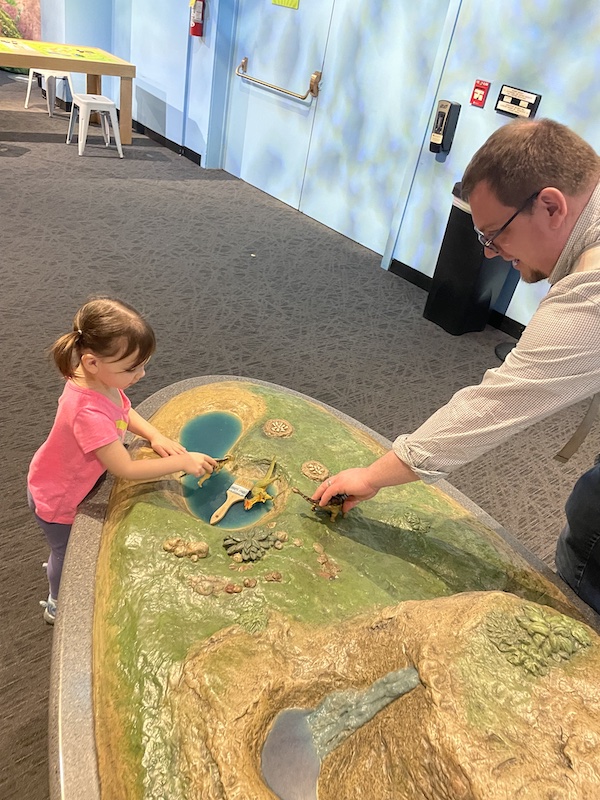
This last March, as both of my academic institutions were on Spring Break, we decided to take an actual break during the week off from classes, which we’ve rarely done because I’ve had grading to complete or courses to prepare. The four of us drove to Indianapolis. We’ve been making our rounds to various cities within a five-hour drive of Urbana, and have so far made it to such far-flung and exotic locales as Madison, Wisconsin; Valparaiso, Indiana; and Cincinnati, Ohio — we’ve got a short trip planned for Traverse City, Michigan later this summer. Pro-tip #1 for traveling with small children: go somewhere close, even though it may not be a cultural mecca. Pro-tip #2: go somewhere with access to a park or somewhere they can play for an hour or two.
Our two-day trip to Indy might not seem all that exciting or fabulous on the surface; we spent an evening swimming in a fifty-five degree hotel pool, fell asleep watching Paw Patrol, and ran amuck for four hours at the Indianapolis Children’s Museum the next day. The trip was also filled with minor stressors: a toddler tantrum before bed, our five-year-old bawling at the prospect of leaving the museum and for not choosing to eat at Cracker Barrel — her favorite restaurant for some reason unknown to either my wife or me — and frequent sibling fights in the backseat. Despite these frustrations and issues and despite the mounting workload that I had piling on my desk, the unfinished article, the book that has only a few pages completed, I took the time to be a father and could not have been more excited to do so.
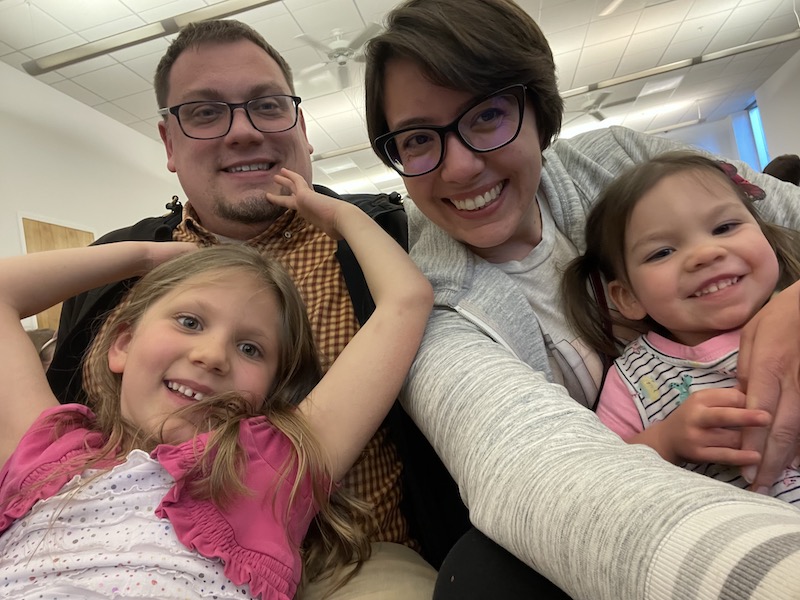
[1] Marloes L. van Engen, Inge L. Bleijenbergh, and Susanne E. Beijer, “Conforming, accommodating, or resisting? How Parents in academia negotiate their professional identity,” Studies in Higher Education 46, no. 8 (2021), 1493.
[2] Van Engen, et. al., “Conforming, accommodating, or resisting?,” 1494.
[3] Several recent studies in the field of psychology and education have begun to document the hybrid identity formation of “academic parents,” including: Eva O.L. Lantsoght, Yvonne Tse Crepaldi, Silvia F. Tavares, Kathleen Leemans, and E.W. Misty Paig-Tran, “Challenges and Opportunities for Academic Parents During CoVID-19,” Frontiers in Psychology 12 (August 2021), https://doi.org/10.3389/fpsyg.2021.645734; Kerry F. Crawford and Leah C. Windsor, The PhD Parenthood Trap: Caught Between Work and Family in Academia (Washington D.C.: Georgetown University Press, 2021); Stephanie Dolamore, Alexander Henderson, Tony Carrizales, “Structural Obstacles for Women in Academia: Availability and Costs of Campus Child Care,” Journal of Public Management and Social Policy 28, no. 1-2 (Fall 2021): 89-107; Rachel Hile Bassett, Parenting and Professing: Balancing Family Work with an Academic Career (Nashville: Vanderbilt University Press, 2005); Karyn E. Miller and Jacqueline Riley, “Changed Landscape, Unchanged Norms: Work-Family Conflict and the Persistence of the Academic Mother Ideal,” Innovation in Higher Education 47 (2022): 471-492.
[4] By using the terms “father” and “mother,” I mean to neither imply nor impose an antiquated understanding of this potentially cis-het normative identity (although I do personally identify as cis-het). Many people who identify as LGBTQ+ may also identify as a father or as a mother. In identifying the voices of fathers, it is my hope to be inclusive of all who identify as a father. It is important to note, however, that the scholarship that does exist on parents in academia is not always clear on its definitions of sexual and gender identities; these studies often assume cis-het normativity among parents and do not frequently account for other identity formations.
[5] Mary Ruth Marotte, Paige Reynolds, Ralph James Savarese, Papa, PhD: Essays on Fatherhood in Academia (New Brunswick, NJ: Rutgers University Press, 2011).
[6] Mary Ruth Marotte, Paige Reynolds, Ralph James Savarese, “Thinking Stiffs: An Introduction,” Papa, PhD, x.
[7] Miller and Riley, “Changed Landscape, Unchanged Norms,” 472-473.
[8] Ibid, 472.
[9] Allison C. Morgan, Samuel F. Way, Michael J.D. Hoefer, Daniel B. Larremore, Mirta Galesic, and Aaron Clauset, “The Unequal Impact of Parenthood in Academia,” Science Advances 7, no. 9 (February 2021), 3, online at: https://www.science.org/doi/epdf/10.1126/sciadv.abd1996.
[10] Ibid.
[11] Ibid, 7.
[12] Robin Wilson, “How Babies Alter Careers for Academics,” Chronicle of Higher Education (December 5, 2003), online at: https://www.chronicle.com/article/how-babies-alter-careers-for-academics/; See also Mary Ann Mason and Marc Goulden, “Marriage and Baby Blues: Redefining Gender Equity in the Academy,” The Annals of the American Academy of Political and Social Science 596, no. 1 (Nov. 2004), 93.
[13] A breakdown of my own hours spent parenting versus working suggests the following: between three part-time jobs I work forty hours a week, not including prep time, grading, emails, office hours, research, or writing. This figure is closer to fifty-six hours on average, once all these other activities are factored in. Mornings and evenings during the week are family time, and I try to spend as much of the weekend as I can with my wife and children as well — some of this is spent on housework, but that’s a hard figure to calculate, since my wife and I seem to be cleaning up constantly. Family time receives slightly less time, approximately fifty-two hours per week, including the weekends. For the specific figures mentioned in the study see Mason and Goulden, “Marriage and Baby Blues,” 99.
[14] Richard J. Reddick, Aaron B. Rochlen, Joseph R. Grasso, Erin D. Reilly, and Daniel D. Spikes, “Academic Fathers Pursuing Tenure: A Qualitative Study of Work-Family Conflict, Coping Strategies, and Departmental Culture,” Psychology of Men and Masculinity 13, no. 1 (January 2012), 1.
[15] Reddick, et. al. “Academic Fathers Pursuing Tenure,” 2.
[16] Ibid.
[17] Leslie Evans Ogden, “Paternity Leave Policies are Improving for Men in Academia: More dads are taking time to be with their families, but policies and supports still have a long way to go,” University Affairs (October 21, 2020), online at: https://www.universityaffairs.ca/features/feature-article/paternity-leave-policies-are-improving-for-dads-in-academia/.
[18] The U.S. is woefully behind other countries when it comes to paternity leave, fathers are limited to twelve weeks paid leave under the Federal Employee Paid Leave Act. This may differ from employer to employer, but twelve weeks is usually the maximum. In the European Union fathers receive a minimum of four months leave. Japan leads all nation-states in paternal leave, offering twelve months paid leave for all citizens.
[19] Richard J. Petts, Chris Knoester, and Jane Waldfogel, “Father’s Paternity Leave-Taking and Children’s Perceptions of Father-Child Relationships in the United States,” Sex Roles 82 (2020): 184.
[20] Reddick, et. al. “Academic Fathers Pursuing Tenure,” 2.
[21] Reddick, et. al. “Academic Fathers Pursuing Tenure,” 6.
[22] Reddick, et. al. “Academic Fathers Pursing Tenure,” 7-8.
[23] One particularly good essay on this subject appears in Papa PhD, with Mike Augspurger discussing his experience of balancing ambition to pursue a particular non-academic career in order to become a better father. See Mike Augspurger, “Dreaming of Direction,” in Papa PhD, 168-175.
[24] David Haven Blake, “On Writing and Rearing,” in Papa PhD, 51.
[25] Ira Strauber, “Doing Things with Words,” in Papa PhD, 56.
[26] Gregory Orfalea, “Sheathing the Sword,” in Papa PhD, 67.
[27] See “Student Parents at Illinois – Parenting Resources,” University of Illinois Office of the Dean of Students, 2023. Online at https://odos.illinois.edu/student-parents/parenting-resources/.
[28] Charles Bane, “Balancing Diapers and a Doctorate: the Adventures of a Single Dad in Grad School,” in Papa PhD, 199.



